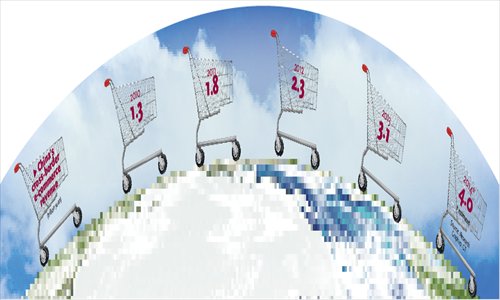Chinese users abandon PayPal
Claim scams resulted in their money in accounts seized by US courts after lawsuits

Source: iResearch Graphics: GT
Many Chinese cross-border merchants have decided to stop using the online payment service offered by US e-commerce powerhouse eBay Inc's PayPal unit, claims a Shenzhen-based retailer.
This is because money in their PayPal accounts were seized by US courts following lawsuits, said the retailer whose PayPal account was also frozen.
"I dare not use PayPal any more. Now I turn to banking transfer, which is safer and more reliable," the retailer of phone accessories surnamed Lin told the Global Times Tuesday.
Lin said that all the money in his PayPal account, nearly $6,500, was transferred out by PayPal due to a US court judgment that ruled that Lin had infringed US clothing company True Religion's trademark.
The young man believes that he was set up. In October 2014, a foreign client contacted a friend of Lin's about buying fake True Religion pants and insisted on conducting the transaction via PayPal. Lin's friend did not have a PayPal account so he borrowed Lin's account, which was frozen by PayPal in December, although no counterfeit deals had been made at that time or any time afterward.
In response to this, PayPal said in an e-mailed statement to the Global Times Tuesday that what PayPal did is in accordance with the US courts' orders.
The company, as the third-party online payment platform, has already informed Chinese users of lawsuits filed by brand companies, suggesting that they answer the case immediately and actively via lawyers, said the statement.
"I have no money to afford a reliable US lawyer, who costs $300-$750 per hour, for lawsuits. And I also do not want to have to deal with troublesome litigation in a foreign country," said Lin.
Lin is not alone. According to another Shenzhen-based PayPal user, who is surnamed Li and in charge of a QQ group set up to help deal with similar complaints, to date, an estimated 5,000 PayPal accounts in China have gotten frozen since April 2014, containing hundreds of millions of US dollars.
Besides Li's group, there are also several others on QQ.
Li told the Global Times Tuesday that some of the Chinese users involved were indeed selling knockoff goods online, but others had been cheated.
For instance, a foreign client would send a Chinese retailer a picture of brand-name products and ask the retailer to help with selling those, and if the retailer said yes and offered his or her own PayPal account, he or she would later receive a lawsuit from a US court, even though no real transaction had been made, Li explained.
Li Heng, a lawyer with the Shenzhen branch office of Beijing Yingke Law Firm, thinks there are some problems with US courts' trial process, especially in lacking sufficient evidence.
"These PayPal cases were closed too fast. As long as the defendants failed to answer the complaints within the given period, the court would completely support the plaintiffs," Li from the Yingke law firm, which is representing some defendants, told the Global Times Tuesday.
The lawyer also noted that those PayPal users are also able to file a lawsuit against PayPal. "The US court orders should not have had an effect on Chinese PayPal accounts which are operated by PayPal's Singapore branch PayPal Private Ltd," Li noted.
PayPal Private Ltd was established in 2006 to serve customers outside the US and the EU, according to an e-mail sent by PayPal to users that year.
Zhao Zhanling, a legal counsel with the Internet Society of China, did not totally agree with Li Heng.
"PayPal Private Ltd is a subsidiary of PayPal and did nothing wrong in following the orders of the parent company. If PayPal can prove it notified users about when their money got frozen, then the company did not violate any laws," Zhao told the Global Times Tuesday.
Chinese merchants can actively protect their legal rights via lawsuits, and meanwhile they also need to enhance their awareness of intellectual property protection, especially when doing cross-border e-commerce, said Zhao.
PayPal, which claimed that it is only a third-party online payment platform and had complied with the US courts' orders, however, seems to have already suffered an outflow of Chinese users.
Many PayPal users in China have stopped using PayPal after these incidents occurred, according to Li, the QQ group founder, signifying a small setback for eBay which is under structure simplification.
According to a Reuters report on January 21, eBay announced a plan to cut about 2,400 jobs, or 7 percent of its workforce in the current quarter.
Experts said that this issue would likely give an opportunity for the development of domestic e-commerce giant Alibaba's third-party payment arm Alipay, which is actively carving territories cross-border e-commerce.
A report by Beijing-based market consultancy iResearch estimated in December 2014 that China's cross-border e-commerce revenue would reach 4 trillion yuan ($640.1 billion) in 2014, increasing from 3.1 trillion yuan in 2013.
The QQ group organizer Li noted that he would not immediately turn to Alipay unless its service was widely adopted by his overseas customers.